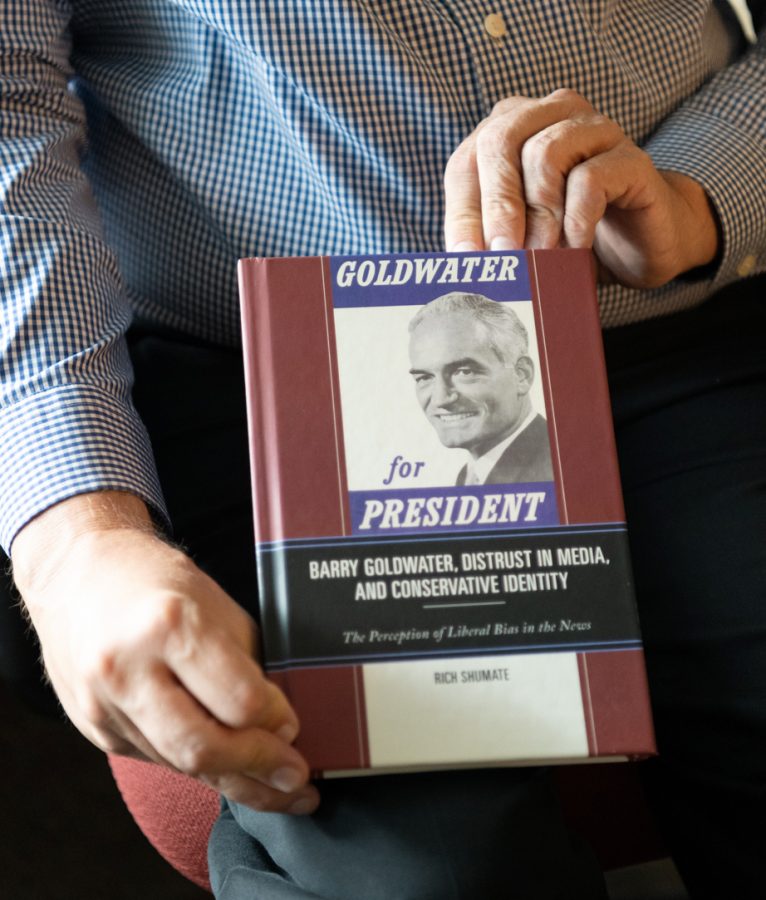Journalism professor publishes book on perception of bias in media
ARTHUR TRICKETT-WILE
Dr. Rich Shumate poses holding his new book, “Goldwater for President,” in his office on the second floor of WKU’s Jody Richards Hall.
September 9, 2021
In Rich Shumate’s experiences as a journalist, he noticed the inaccurate perception of news media bias and the distrust of the media, which he addresses as the subject of his new book.
Shumate, assistant professor in the School of Media, has published a book titled “Barry Goldwater, Distrust in Media, and Conservative Identity: The Perception of Liberal Bias in the News” which covers the presumed bias and mistrust in the media by conservative groups.
“I started out doing this research as my doctoral dissertation at the University of Florida. I was interested in exploring why conservatives in the United States think that the news media have a liberal bias,” Shumate said. “I was a reporter before I went to be a professor, so I understood the standards and procedures in journalism to prevent deliberate bias … but yet conservatives felt this way, so why did they feel this way?”
To find out, Shumate targeted the early 60’s and examined the rise of the conservatism we know today.
“What I wanted to do was just try to determine why they feel this way, and what I came up with was that it has to do with conservatives’ need to maintain their social identity as conservatives,” Shumate said. “This is historical, because I looked at the period from 1960 to 1964, which was really when conservatism organized and nominated Barry Goldwater in 1964 … and in some ways it was a rebellion against the ‘elite’ media, and people who we believe are elites.”
Shumate agreed that the connection between past and present conservative mindsets is something journalists and everyday citizens should be aware of.
“I think one of the things that make this book very timely is that what happened on January 6th, very many people were willing to believe that the election was fraudulent, even though the news media was telling them there was no evidence it was fraudulent,” Shumate said. “They’ve been primed for 60 years to think that the news media has a liberal bias, so this is an important thing to understand because that has led somewhere that is not good.”
Shumate decided to approach the issue from a social psychology standpoint, in contrast to previous explanations that attempted to measure or define bias.
“Working in the news media I always knew that nobody was trying to be deliberately biased […] It was interesting to me that this perception wasn’t really rooted in anything the news media was doing, but why was it happening? Why were people feeling this way?” Shumate questioned. “Because they legitimately feel this way, whether you think that their feelings are legitimate or not, and I wanted to know why they felt this way.”
These questions constructed the bigger picture of Shumate’s book. Unlike other research on the subject that searches for a solid answer on whether bias might be occurring, the book tries to understand why citizens may be viewing the news media in this light.
And yet, despite a call to understand those perpetuating this supposed liberal bias, Shumate feels wary about the future of journalism and news media alongside this mistrust.
“I can’t really see right now what the way forward is. It’s a very threatening and sort of unsettling problem that so many people simply don’t trust the media, even when the media is telling them things that are most definitely true,” Shumate stated. “How can a democracy function if there’s no agreement on truth? I do think that that’s something the news media is trying to get their hands around, and I do think the book provides some insight about why that might be.”
Shumate explained that this disagreement might open up opportunities for good, truthful journalism. As a professor, Shumate understands the importance of educating his students on different biases.
“I think what we try to instill in the students in the journalism program is to be impartial and to strive to always be that way,” Shumate said. “One of the things I’ve noticed in the last few years is that we have a lot of students coming in who are committed to the idea of doing good journalism; I actually think that all the turmoil and criticism of this has actually encouraged some people to study journalism, mainly because they want to be in this fight for truth.”
Shumate shared these ideas may be important for newer journalists in order to better understand why this bias and mistrust occurs.
“I think there’s a tendency for a lot of journalists to discount that conservatives feel this way and to just say they’re being irrational. I think it’s useful to understand why they feel that way,” Shumate said. “As I talk about in the book, the fact that they feel that way means that liberal bias exists because they think it exists. And we can’t just ignore that. I will work with my students on that as well.”
At the core of Shumate’s focus is his students. He expressed his want for journalists to understand why conservatives believe in a liberal bias in the news media, but at the heart of this issue is that journalists still must fight to get rid of this perception.
News reporter Alexandria Anderson can be reached at [email protected].


























